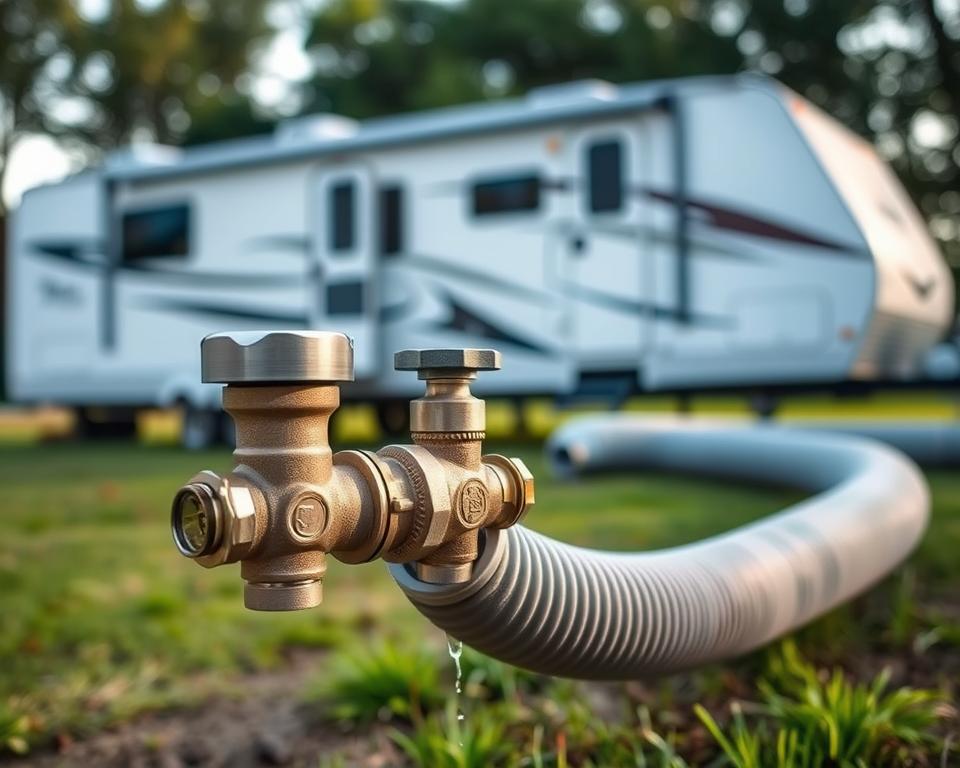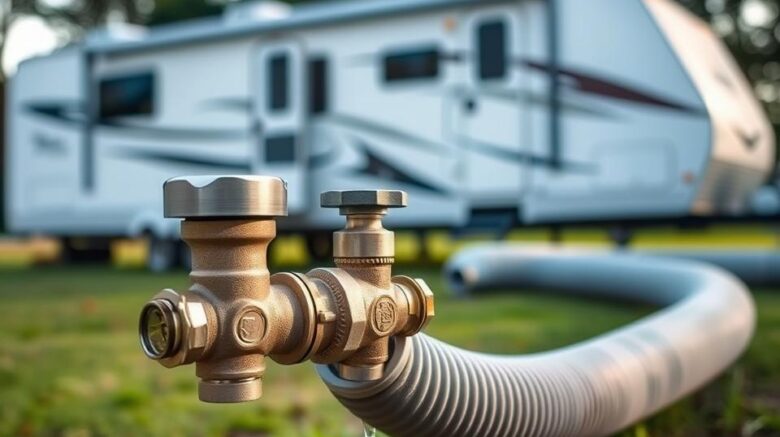RV Septic Tank Pumping: Must-Read Guide
Overlooking a recreational vehicle septic system can quickly turn an expensive mistake. If you travel with an RV or mobile rig, it’s imperative to comprehend the essence of trailer septic Tank Pumping. It secures your road adventures are uninterrupted and living conditions remain sanitary on the road. By highlighting regular RV septic tank service, this guide aims to make you prepared in caring for your septic system, avoiding potential headaches — particularly while enjoying the great outdoors.
Within these pages, an in-depth insight into selecting solid mobile septic services is offered. Plus, discover to spot when your septic Tank requires prompt attention. Understanding the process for efficient RV septic Tank Pumping is also covered. Instead of scrambling to issues as they arise, enable this guide to arm you with necessary knowledge. This sets up your RV experiences keep free of concern!
The Value of Scheduled RV Septic Tank Pumping
Timely upkeep of your trailer’s septic Tank is key for its wastewater system’s functionality. Delaying this can result in clogs and backups, ruining your vacation and hurting the environment. Sewage leaks from an full Tank can soil the area, posing major concerns.
Hiring professional Pumping services like All in Sanitation is wise for RV owners. This step avoids issues and boosts your system’s functionality and longevity. On-schedule Pump-outs deliver a safer, safer environment in RV parks and campgrounds.
Understanding Your Trailer’s Septic System
A camper septic system includes three primary elements: the black water Tank, grey water Tank, and fresh water Tank. For RV owners, it’s important to know these parts. They are central in waste management. The black water Tank captures toilet sewage, while the grey water Tank holds water from sinks and showers.
Each Tank has a distinct role in keeping the trailer sanitary and operational. Monitoring the levels in the black water and grey water Tanks is crucial. It prevents overflows, bad smells, and damage to the septic system.
For quick reference, below is a table that compares differences between the black water and grey water Tanks:
| Feature | Black Water Tank | Grey Water Tank |
|---|---|---|
| Purpose | Keeps sewage waste | Collects wastewater from sinks and showers |
| Maintenance Frequency | Requires routine Pumping | Needs infrequent emptying |
| Potential Issues | Odors, blockages from solids | Risk of grease buildup |
| Typical Size | Generally bigger than grey water Tank | Smaller than black water Tank typically |
Knowing your trailer’s septic system is foundational for maintenance. It ensures pleasant travel experiences. Staying mindful of both Tanks delivers trips with zero septic concerns.

Signs Your Septic Tank Needs Pumping
It’s important to know when your septic Tank needs Pumping to protect your system sound. Detecting issues early can sidestep major repairs and environmental harm. Key signs that demand attention include:
- Slow draining sinks, which may indicate a full Tank or clog.
- Gurgling toilets, suggesting blocked pipes or a failing septic system.
- Foul odors around your camper, an early warning of rising sewage.
- Pooling water near the drain field, suggesting that your Tank may be overwhelmed.
- Sewage backups in your toilets or drains, a clear sign prompt action is needed.
Becoming aware of these signs enables RV owners to take quick action, preventing grave issues. Monitoring your system and reacting to these indicators can prolong your septic system’s lifespan. This approach ensures a better trailer experience.
What Determines Pumping Frequency
A septic Tank’s capacity directly affects how often it requires Pumping. Larger Tanks demand less frequent service because they hold more waste, in contrast smaller Tanks call for closer-interval Pumping.
The campers present using the septic system also changes Pumping frequency. With more RVs, the system experiences greater strain, necessitating more frequent Pumping. Notably through peak seasons, adjusting the schedule is vital to avoid problems.
Here is a table that summarizes recommended Pumping intervals based on typical scenarios:
| Septic Tank Size | Number of RVs | Recommended Pumping Frequency |
|---|---|---|
| 500 gallons | 1-2 RVs | Every 2-3 years |
| 1000 gallons | 2-4 RVs | Roughly 3-5 years |
| 1500 gallons | 4+ RVs | As often as 1-2 years |
Thoughtfully determining your septic Tank’s Pumping frequency optimizes its operation. It also extends its life and effectiveness. This decision is vital for maintaining system health.
How to Choose a Dependable Septic Pumping Service
Choosing a solid septic Pumping service is vital for your trailer’s septic system health. It ensures prompt and efficient Pumping, averting costly future repairs. When evaluating a septic service provider, weigh these critical aspects:
- Experience: Look for companies with a proven track record. Their experience with various septic systems, especially those for trailers, is paramount.
- Customer Reviews: Scan online reviews and testimonials. Positive feedback and high ratings are indicators of a dependable provider.
- Response Time: Fast response times reflect a company’s focus to their customers and ability to meet their needs efficiently.
- Knowledge of Systems: Specialized knowledge of RV septic systems differentiates some services. Providers like All in Sanitation grasp these systems well, enabling specialized service.
Give weight to these considerations to find the most appropriate service for your septic requirements. A dependable septic Pumping service extends your system’s life and performance, enabling carefree travel adventures.
RV Septic Tank Pumping: How It Works
Motorhome septic Tank Pumping follows critical steps for efficiency and safety. It’s crucial for RV owners to grasp this process before service appointments.
A technician with a trailer-mounted Pump arrives first, tailored to mobile systems. This technology enables effective waste removal while preserving the environment. They connect the Pump to the trailer’s system with a hose reaching the Tank.
The Pump then pulls the waste out of the Tank. This action is essential to preserve the septic system sound and prevent overflow. After emptying, the technician examines the Tank for damage or wear, verifying proper function.
Following the Pump-out, waste disposal is paramount. The hauled waste is brought to treatment facilities for safe processing. This step minimizes environmental harm.
The process benefits from the trailer-mounted Pump’s efficiency. Scheduled service cuts time and cost, maintaining the septic system in prime condition.
24/7 Septic Pumping Services
Unexpected issues with your septic system can require instant intervention. For RV enthusiasts, understanding when to seek emergency septic Pumping is crucial to prevent further damage and exorbitant costs. Scenarios demanding prompt septic Tank Pumping include backups, unpleasant smells, and sewage leaks. Quickly addressing these issues often requires septic Tank Pump and haul services to effectively eliminate waste and restore system functionality.
Providers like All in Sanitation offer 24/7 emergency septic Pumping, ensuring help is immediately available in a pinch. Acting fast with these services significantly improves your septic system’s lifespan and performance. Having a trusted septic service close at hand can mitigate expenses and stress in emergencies, ensuring uninterrupted enjoyment of RV adventures.
Pointers for Maintaining Your Trailer Septic System
Keeping your trailer’s septic system in excellent shape is vital. Proper maintenance strategies can save you from costly problems later. First, do regular checks for damage, leaks, or strange smells for RV septic Tank care.
Proper waste disposal is key for a healthy system. Don’t flush items that won’t break down, and choose septic-friendly products. It’s vital that everyone is aware of how their actions influence the septic system. This makes certain it stays functional and efficient.
- Conduct routine checks for leaks and unusual odors.
- Communicate regularly with your septic service provider for on-schedule maintenance.
- Utilize septic-safe toilet paper and cleaning supplies.
- Stop pouring chemicals down the drain that could damage the balance of bacteria in the Tank.
- Schedule for routine professional inspections to detect potential issues early.
Following these steps enables RV owners lengthen their trailer septic systems’ life and performance.
Common Issues with RV Septic Systems
Trailer septic systems often face issues that annoy RV owners. Handle these issues early to sidestep bigger problems later. Clogs in septic Tanks are regular, mainly due to not disposing of waste properly. To reduce clogs, stick with RV-safe toilet paper and perform regular maintenance.
Another significant issue is odor control. Bad smells can signal backups or leaks, demanding immediate action. To reduce odors, ensure the system is properly vented and the septic Tank is emptied on schedule.
Leaks can occur from wear or incorrect installations. Swift identification of leaks helps avoiding environmental damage and maintains the system working. Regular inspections are important to spot these issues early.
To prevent common issues, follow preventative strategies like routine service and proper waste disposal. Informed and proactive RV owners can savor their travels care-free and with peace of mind.
As a Final Point
Understanding RV septic Tank Pumping is vital for RV and trailer owners. Scheduled maintenance and spotting trouble signs in your septic system can enhance your RVing experience immensely. Managing your RV’s septic system well guarantees both safety and comfort during your outdoor adventures.
Selecting a dependable service for your camper’s septic Tank Pumping is critical. Engaging experts like All in Sanitation ensures your mobile waste management is first-rate. This approach is not just eco-friendly, but it also enhances the camping experience, making it more enjoyable and sustainable.
Consistently maintaining your septic system reduces emergencies, enhancing your nature stays. Thorough care and understanding empower memorable trips for the best reasons.
